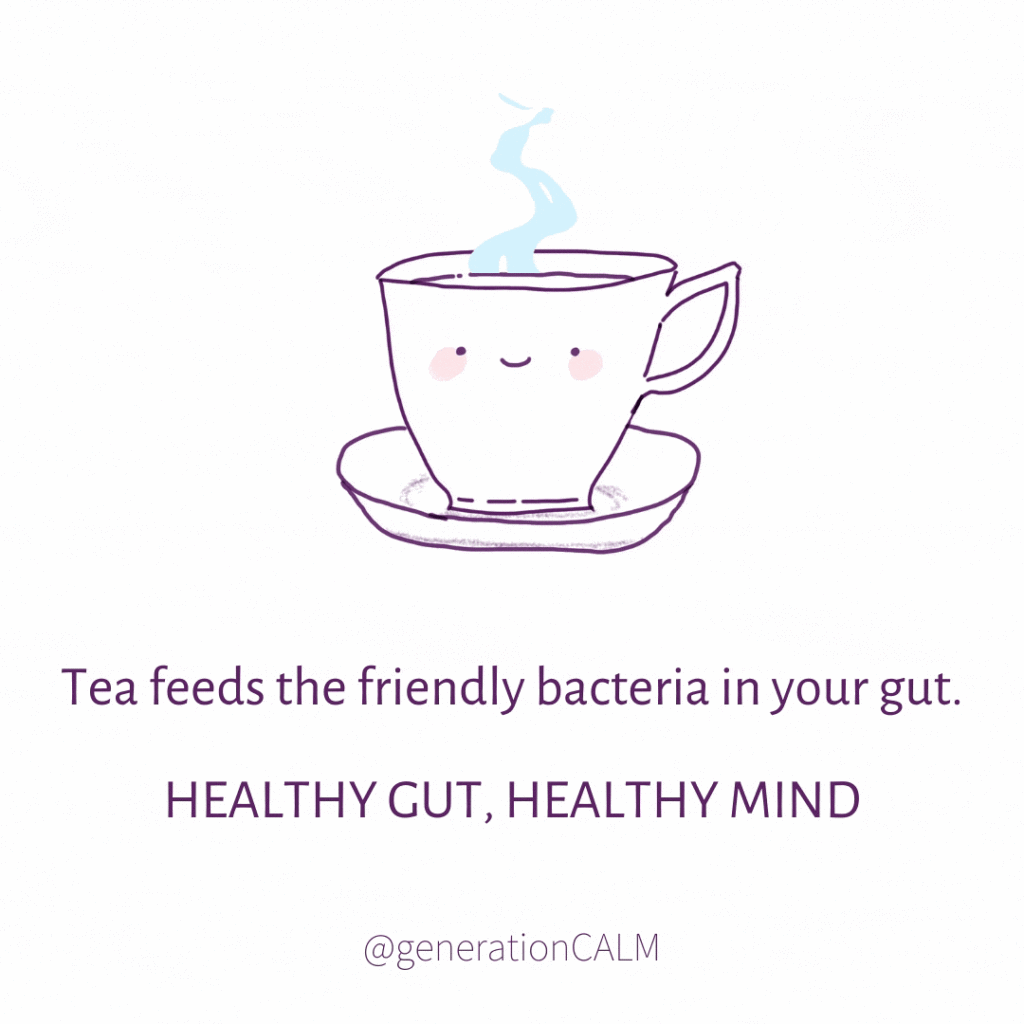Why A Healthy Gut is Important for Anxiety
Is it possible to relieve your anxiety with a healthy gut?
Your body and mind are part of one unit. So it makes sense that helping your gut will calm your mind. And calming your mind will heal your gut.
Considering how long we’ve known that stress can influence our health in a negative way, it’s surprising that it has only been in the last decade that we’ve understood it’s because stress affects the gut.
Inside your gut are little bacteria, fungi, and other tiny organisms which are important in breaking down your food and manufacturing vitamins, cleaning up toxins and producing your immune response. It’s like a factory inside your ‘insides’.
These little bacteria are called microbiota. Collectively, the trillions of organisms are known as the gut microbiome and I’m surprised David Attenborough has never created a BBC Planet Gut series because your gut microbiome has the potential to be as diverse as any ecosystem. Each type of microbiota have a different function in your body and are essential to your good health.
What is the gut brain axis?
It turns out that your gut has as many neurons and sensors in it as the brain in your head.
Your gut and brain communicate with each other. And I mean really communicate. Not like the brain shouts out orders and the gut listens and obeys. The communication goes both ways.
Studies have shown that communication happens on a stretch of neural highway in your body called the vagus nerve. This long nerve conveniently runs from the brain all the way to your bottom. With smaller branches of road leading off to your heart, and different parts of your digestive system.
The information is collected from your gut and various parts of your body and sent to your brain to process how your body is doing in the moment. Your gut has a unique barometer on how your body is feeling because it is only one-cell thick compared to your brain, which is heavily insulated. So, your ‘gut-feelings’ can be picked up quickly.
This information from your gut does not affect every area of your brain. But it does travel to stations in the brain that deal with emotions, fear and self-awareness. So if your gut is nice and healthy, it should be easier to remain calm, keep your emotions on an even keel, and understand your thoughts, feelings and behaviors.
Equally, when your mind is feeling nice and calm, your gut can do it’s job better. Providing a good working environment to produce hormones, immune function and digestion.
All your life this communication between your gut and brain has been happening. Think about the comfortable, tired feeling after a good meal, or how irritated you can get when hungry.
Anxiety and your gut health
Working as a Clinical Psychologist, clients came to therapy to talk about their ‘anxiety’ or ‘depression’. But these clients also had very real, very physical symptoms, especially with their digestive system. Although we think of mental health originating in the brain – it’s possible it all starts in the gut.
Stress can influence the microorganisms that live in your gastrointestinal tract. In turn, the gut microbiota influences a persons stress response. This means that gut microbiota are an important mediator of health, especially when it comes to mental wellness.
Stress has been shown to disrupt the gut microbiota. And cause it to become off-balance, known as ‘gut dysbiosis’. Have you ever watched a football match when the fans of the winning team run onto the football field at the end of the game. All of a sudden you see a mass of red shirts and all of the players in blue shirts get swallowed up and lost because they’re vastly outnumbered. This is what an off-balance gut microbiome looks like. One particular type of bacteria will outnumber the others and take over, stopping the variety of bacteria from doing their jobs efficiently.
And it’s not just what you eat that has an effect on this. Something as simple as lack of sleep or disruption of your circadian rhythm (if you work nights or have jet lag) is a physical stressor that can cause a disturbance in your gut.
An example of the gut-brain connection
Let’s put this into context. Lisa is a part-time nurse, spending time between home, where she looks after her two children, and at work, where she’s part of a primary care team. Lisa’s stress looks like this:
Physical stress
– Lack of sleep due to kids waking her up early.
– Circadian rhythm disrupted due to occasional shift work
– Doesn’t always find the time to eat balanced meals.
Emotional/ psychological stress
– Juggling the needs of patients compared to how much time she can devote to each patient
– Demanding manager
– Never feeling like she’s there for her kids and husband
Environmental stress
– Constant noise whether at work or at home
– Exposure to toxins at work
As you can see, Lisa has a great deal of stress which can disrupt her gut microbiome. It’s quite possible that she’s already feeling some digestive distress such as constipation or bloating. So what can Lisa, or someone like Lisa, do to protect her gut and to improve her mental wellness?
Lisa already has a lot going on. We don’t want her to have to do more to feel better. So she could take one of these areas of her life and for 3-4 weeks just concentrate on making that one area a little easier. For example, if she wants to have a better working relationship with her manager, she could start journaling about her thoughts and feelings regarding her boss. Learn how to set boundaries with her manager. Or she could find ways to cope with the stress of dealing with her boss such as going for a walk in the hospital park during break times, doing mindfulness or seek additional support from a counselor at work.
Lisa’s stress is quite likely to be causing a change to her gut microbiome, so if she can start adding more whole fruits and vegetable to her current meals, that could really help to balance her beneficial bacteria.
What is a more healthy gut microbiome?
The consensus at the moment is that the more diverse your microbiome the better. It’s like running a hospital. If you only have managers, patients won’t get better. But if you have a wide range of professions … doctors, nurses, receptionists, nutritionists and managers … the patients have a better chance of success. So, too, the more diverse your microbiome, the more functions your body can do creating overall wellness.
The distinction between bad and good bacteria is not always that black and white. It’s more about having enough of the right kind of bacteria so the not so good ones don’t take over and cause havoc. The word we need to remember is balance.
How to improve your gut microbiome
FOOD
The food you eat has a direct effect on your microbiome. Foods such as legumes, beans, yogurts, fermented foods and a wide variety of vegetables create a more diverse microbiome. We have a tendency to stick with the same five vegetables week in, week out. Be aware of this and try to mix it up. Eating seasonally is one way you can achieve this.
Prebiotics are foods that feed the bacteria you already have inside you, so they are just as important. Prebiotics include foods such as garlic, leeks, bananas and asparagus.
If you’re a tea drinker, you’ll be pleased to know that the compounds in tea can lead to a well-balanced gut microbiome. The most evidence is for green tea, but it’s also suggested that black, oolong and fermented dark teas can influence the diversity of microbiota in your gut.

Do your best to cut out excess sugar and processed foods as these work against your good gut bacteria.
It doesn’t take long for you to turn a dysbiotic gut into a diverse and healthy one … three weeks (although aim for over six months to see stronger effects)! So it’s worth adding some diversity to your daily diet if it can directly impact your mental health.
RELAXATION
Relaxation indirectly affects your gut microbiome. Stress and anxiety stresses out your digestive system and relaxation relaxes it. Simple! So anything that helps to relax and cope with stress is good at supporting a healthy gut. Activities such as guided meditation, journaling, mindfulness, yoga all help to reduce stress naturally.
PETS
Pet owners have been shown to have a more diverse gut microbiome than non-pet owners. It’s thought they are introduced to environmental bacteria that the pets have or have picked up on their daily travels in the neighborhood.
GARDENING
Caring for plants and letting your hands get dirty in the soil has a two-pronged, beneficial effect. The microbacteria in the soil can be breathed in and transported via your hands making your gut microbiome more diverse. But being around plants is healthy and stress-relieving too. Visiting parks can have the same effect.
You know that woodsy scent of pine trees?
Trees give off a scent of natural essential oils called phytoncides. They protect the tree from harmful insects and germs. Being in a tree-filled environment and breathing in those phytoncides can also protect you. Studies have shown that being in a forest can increase white blood cells (those that are cancer-fighting) and reduces stress hormones and, yes, it’s possible this process happens in the gut. Some doctors now use nature prescriptions because they recognize the benefits of nature on reducing stress, reducing anxiety, reducing blood pressure and improving mood.
So stop and breathe in the trees.
SLEEP
Your circadian rhythm is your internal body clock that determines what time of day is optimal for certain bodily functions. Your gut has certain times which are optimal for their important processes which is tied in with your sleep patterns. So if you don’t have a regular sleep routine, you may find other areas of your health are impacted for the worse.
Additionally, those with anxiety and depression are more likely to have disturbed sleep patterns. Better sleep leads to a better gut, which leads to mental wellness.
PHYSICAL EXERCISE
There is a middle ground when it comes to exercise and your gut health. Studies have shown that strenuous exercise (intense, prolonged exercise) can lead to digestive distress and negative changes to your gut bacteria. However, getting regular exercise is vital to staying fit and healthy and is especially helpful in reducing anxiety.
Will improving my gut health really improve my anxiety?
A well-balanced gut is crucial to a healthy body and mind. Gut microbiota are an important mediator of health, especially when it comes to mental wellness. For a healthy gut you want a diverse population of microbiota. When you are over-stressed or in constant anxiety, your digestive system goes into shut down mode, and can result in gut dysbiosis.
The clinical relevance of your gut-brain communication is so huge that scientists are now studying the role of using probiotics, known as psychobiotics, for a range of mental health disorders. These can modify the composition of your gut microbiome to be beneficial for better mental health. Being able to manipulate your gut microbiota may be a useful addition to therapy for anxiety.
Health professionals and scientists are still in the early stages of understanding the relevance of your gut health on your mental health. But there is already strong evidence that looking after your gut is good for your mood and your brain. Your gut is so much more than just digestion. Perhaps soon you will be able to treat mental health conditions such as anxiety and depression by directly improving your gut health.

If you like this blog post, pop on over to my YouTube channel and check out my meditations for a healthy gut.

